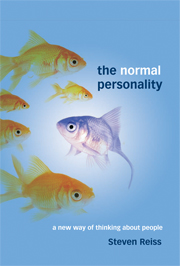Book contents
- Frontmatter
- Contents
- Acknowledgments
- Overview
- 1 My Wife Thinks Something Is Wrong with Me
- 2 The Sixteen Basic Desires
- 3 Intensity of Basic Motivation
- 4 Normal Personality Types
- 5 Overcoming Personal Troubles
- 6 Six Reasons for Adolescent Underachievement
- 7 Self-Hugging and Personal Blind Spots
- 8 Relationships
- 9 Reinterpretation of Myers-Briggs Personality Types
- 10 The Sixteen Principles of Motivation
- APPENDIX A Dictionary of Normal Personality Traits
- APPENDIX B Reiss Motivation Profile Estimator
- APPENDIX C The Sixteen Basic Desires at a Glance
- Notes
- References
- Index
3 - Intensity of Basic Motivation
Published online by Cambridge University Press: 05 June 2012
- Frontmatter
- Contents
- Acknowledgments
- Overview
- 1 My Wife Thinks Something Is Wrong with Me
- 2 The Sixteen Basic Desires
- 3 Intensity of Basic Motivation
- 4 Normal Personality Types
- 5 Overcoming Personal Troubles
- 6 Six Reasons for Adolescent Underachievement
- 7 Self-Hugging and Personal Blind Spots
- 8 Relationships
- 9 Reinterpretation of Myers-Briggs Personality Types
- 10 The Sixteen Principles of Motivation
- APPENDIX A Dictionary of Normal Personality Traits
- APPENDIX B Reiss Motivation Profile Estimator
- APPENDIX C The Sixteen Basic Desires at a Glance
- Notes
- References
- Index
Summary
The same basic desire (or psychological need) at varying intensities produces different personality traits. Aristotle's (1953/330 b.c.e., Book III) brilliant analysis of vices, virtues, and moderation made this point centuries ago. According to Aristotle, deficient, moderate, and excessive intensities of the same life motive can yield different, and even opposite, personality traits. Insufficient, moderate, and excessive predispositions to become fearful, respectively, cause the personality traits of foolhardiness, courage, and cowardice. Insufficient, moderate, and excessive desires for wealth, respectively, cause the personality traits of shabbiness, magnificence, and vulgarity. Insufficient, moderate, and excessive desires for social contact, respectively, cause the personality traits of boorishness, friendliness, and buffoonery.
Table 3.1 shows the theoretical connections between the sixteen basic desires and personality traits. The table is intended to show how certain personality traits might be caused by the same motive but at different intensities.
Here is how to read Table 3.1. The need for acceptance is one of the sixteen universal desires of humankind. Everybody is motivated to be accepted, but to different extents. People who have an insufficient (very weak) basic desire for acceptance appear to others as overconfident. Those with a low-intensity (or weak) basic desire for acceptance impress others as self-confident. People who have an average-intensity basic desire for acceptance make no distinctive impression on other people with regard to how confident they are. They may have confidence in some situations and lack confidence in others.
- Type
- Chapter
- Information
- The Normal PersonalityA New Way of Thinking about People, pp. 37 - 55Publisher: Cambridge University PressPrint publication year: 2008

